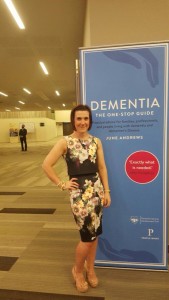In our #ebnjc blog series we have already celebrated children’s nursing; with blogs from Jayne Pentin, Kirsten Huby & Marcus Wootton, learning disability nursing; with blogs from Professor Ruth Northway, Jonathan Beebee & Amy Wixey, midwifery; with blogs from Louise Silverton CBE , Gina Novick & Lynsey Wilgaus, and adult nursing from Clare McVeigh, Professor Roger Watson, Professor Jan Dewing & Professor Elizabeth Robb
This week our #ebnjc December blog series concludes with four guest blogs on mental health nursing from Neil Withnell, Jessie McGreevy, Paul Canning & Peter Jones.
Today we welcome Jessie McGreevy, a dementia care specialist from Four Seasons Health Care. Today Jessie, a finalist in the recent Nursing Times Awards, discusses the topical issue of therapeutic lying in dementia care.
To lie or not to lie? That is the question.
Perhaps one of the most frequent questions I get asked as a dementia care educator working with health care staff is; can we lie to people living with dementia if it makes them feel better? Although a very simple question it is not so simple to answer. Legislation and policy forbid lying to people in care with the NMC stating that nurses must be honest and trustworthy. In principle I completely agree that ‘honesty is the best policy’ however when caring for people living with dementia there are times where perhaps honesty would in fact cause more harm than good.
It is well illustrated in literature that people living with dementia often live in a distorted reality than the true reality of everyday life. For example a person may perceive themselves to be living in 1975 when they were 40 years old, they had small children and their parents were still alive. The current belief is that health care staff should join a person in their reality in order to reduce distress and prevent feelings of anxiety or insecurity. If this is to happen, it is understandable that a certain amount of ‘bending the truth’ is going to happen often called a therapeutic lie; a lie with a positive outcome. One of the most common situations faced by carers is that of a person living with dementia asking for their wife/ husband forgetting that they have passed away many years ago. Currently when this situation arises we usually only see two options; tell the truth; that the person has passed away and cause feelings of grief or lie and say the person is at work and avoid any distress. Although I cannot give a definitive answer to the question ‘should we lie’ I can give a different perspective on the situations where this question may arise.
In fact we are actually asking the wrong question. The question shouldn’t be; should we lie? The question should be what is the person really asking for, what are they telling me? Again literature highlights that people living with dementia often communicate in ways we as carers find difficult to understand; rather than using straight forward sentences an unmet need is often communicated through repetitive movements/ questions, a change in mood or physical actions. So when a person living with dementia is asking for their mum/ dad/ children or to go home step back and think what are they really asking for; often it is not the specific person or thing but a communication of an unmet emotional need. The table below highlights the most common times when the question of ‘lying’ would be raised, with an interpretation of what the person might be trying and examples of how to respond;
| Situation | What is being communicated | How to respond |
| Where is my mum | Wanting to feel loved, safe, secure, comforted and attached. | Spend time with the person, provide reassurance, get to know them and develop a therapeutic relationship. Use pictures and talk about their mum which will bring back happy memories rather than trying to avoiding talking about her as this will further add to the anxiety.
|
| Where is my dad | Wanting security, guidance and to feel safe. | Spend time with the person ensure they know what’s going on at all times (what’s coming next, routine). Develop a trusting, therapeutic relationship that will make the person feel safe and provide a person to talk to if they are worried. Use pictures and talk about their dad, avoidance can cause more distress.
|
| Where are my children | Wanting to feel loved, purpose, comforted and have a sense of belonging, comforted, | Give the person purpose throughout the day (normal activities) such as setting tables, dusting, helping with laundry, folding clothes or doing simple cooking (missing ingredients, writing shopping lists). Get to know the resident, spend time chatting with them asking about their life, sharing stories, laughing, making them feel loved and happy.
|
| Where is my husband | Wanting to feel loved, safe, secure, have a sense of belonging, friendship. | Encourage the person to develop friendships with other residents or staff within the home so they do not feel lonely. Use pictures and chat about family, talking can be a very healing process.
|
| I want to go home | Wanting to a sense of control, acceptance, familiarity and comfort. | Make the environment as homely as possible using personal objects, familiar layouts and furnishings/ décor. Encourage the person to be as involved in the environment as possible, doing all the things they would have done at home; tidying up, cooking etc.
|
If situations are looked at in this manor first we will not be masking the problem with a lie, instead the root of the behaviour will be identified and treated reducing the occurrence of distress and the need carers to tell therapeutic lies. However I must also note that this approach may not work in all situations and so the need for a therapeutic lie remains in some situations. I am not saying I agree or disagree with their use but if taken on an individual basis as advocated in a person centred approach to care and if used as a last resort in line with deprivation of liberties principles (Mental capacity act, 2005) it can be an effective approach to alleviating distress.
Jessie McGreevy.
EBN Recommends:
- Kurtz, M. (2013) ‘Cross-sectional study: In individuals with schizophrenia, duration and severity of mental illness, health status, mutuality, employment and household income influence quality of life ‘, Evidence Based Nursing, 16, (3), pp. 79-80
- Gulliver, A. (2015) ‘Cross-sectional study: A range of personality traits and health beliefs influence mental health help-seeking behaviour in young people’, Evidence Based Nursing, 18, (4), pp. 117.
- Haddad, M. (2010) ‘Cross sectional survey: Different attitudes towards mental health revealed in a survey of nurses across five European countries; more positive attitudes found in Portugal, in women and in those in senior roles’, Evidence Based Nursing, 13, (4), pp. 128-129.
- Gaskin, C. and Hardy, S. (2015) ‘The state of play in child and adolescent mental healthcare services (England): not in front of the children?’, Evidence Based Nursing, 18, (3), pp. 1.
- Dr Alison Twycross and Dr Peter Mills Podcast on Self harm within inpatient psychiatric services.

